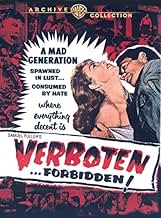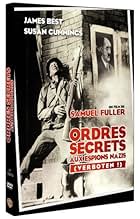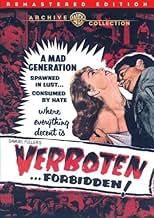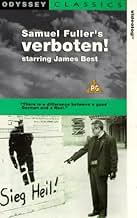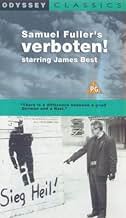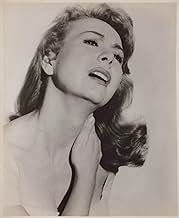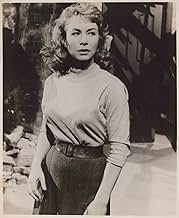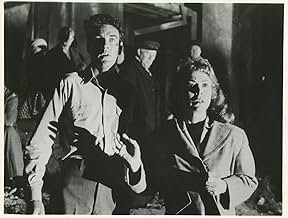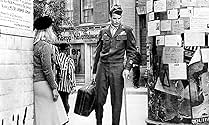Un militar estadounidense, establecido en Alemania tras la caída del Tercer Reich, pone en peligro su puesto en el Plan Marshall al romper la regla de no fraternidad y enamorarse de una jove... Leer todoUn militar estadounidense, establecido en Alemania tras la caída del Tercer Reich, pone en peligro su puesto en el Plan Marshall al romper la regla de no fraternidad y enamorarse de una joven alemana.Un militar estadounidense, establecido en Alemania tras la caída del Tercer Reich, pone en peligro su puesto en el Plan Marshall al romper la regla de no fraternidad y enamorarse de una joven alemana.
- Dirección
- Guionista
- Elenco
Joe Turkel
- Infantryman
- (as Joseph Turkel)
Karl Dönitz
- Self
- (material de archivo)
- (sin créditos)
Hans Fritzsche
- Self
- (material de archivo)
- (sin créditos)
Joseph Goebbels
- Self
- (material de archivo)
- (sin créditos)
Hermann Göring
- Self
- (material de archivo)
- (sin créditos)
- Dirección
- Guionista
- Todo el elenco y el equipo
- Producción, taquilla y más en IMDbPro
Opiniones destacadas
There is Only One Sam Fuller and His Detractors might say that was Certainly Enough. But No One can Argue that Sam Fuller made Boring, Uninteresting, or Common Movies. He was Anything but Common.
While watching a Fuller Movie one is Struck by the Audaciousness as it Unspools with the Usual Low-Budget and Barely Professional Actors. For His Films are all about the Subject. Be it War, Western, Crime, or any Number of Odd Stories He chose to do, Sam Fuller always gave His Heart and Soul.
In this WWII Movie it is the Very End and Post War Germany that is the Setting and the Nazis have been Reduced to Nothing More than a Street Gang and the Occupiers are Struggling to keep all the Threads of Society from coming Unraveled. The Most Basic Things like Food and Medicine are in Short Supply and there is Never a Shortage of Suffering People.
This is just some of the Layers that Fuller Uses here to Elicit a Template of Surreal Cynicism. The Claustrophobic Sets and the Dense Lighting also Manage a Meilu of a Hell on Earth. Posters and Leaflets are Wallpaper and Signposts and the Love Story is not only Edgy but Verboten. This is the Writer/Director's Vintage Heavy Handedness that is a Delight to Watch and is Another Example why there is Only One Sam Fuller.
While watching a Fuller Movie one is Struck by the Audaciousness as it Unspools with the Usual Low-Budget and Barely Professional Actors. For His Films are all about the Subject. Be it War, Western, Crime, or any Number of Odd Stories He chose to do, Sam Fuller always gave His Heart and Soul.
In this WWII Movie it is the Very End and Post War Germany that is the Setting and the Nazis have been Reduced to Nothing More than a Street Gang and the Occupiers are Struggling to keep all the Threads of Society from coming Unraveled. The Most Basic Things like Food and Medicine are in Short Supply and there is Never a Shortage of Suffering People.
This is just some of the Layers that Fuller Uses here to Elicit a Template of Surreal Cynicism. The Claustrophobic Sets and the Dense Lighting also Manage a Meilu of a Hell on Earth. Posters and Leaflets are Wallpaper and Signposts and the Love Story is not only Edgy but Verboten. This is the Writer/Director's Vintage Heavy Handedness that is a Delight to Watch and is Another Example why there is Only One Sam Fuller.
One of Fuller's (a combat veteran himself) early works of average quality, but accurately hits on the many conflicting aspects of life in postwar Germany. The main character starts the movie in Apr'45 as a Sgt with C Co, 157th Inf, 45th Div, which really did end the war in Munich as in the movie. (Same unit in the previous month had fought heavily in Aschaffenburg and then liberated part of the Dachau facility). To the uninformed the movie may seem confusing by flip flopping between showing the good & bad of the german people. But anyone who has been there or at least well read on it would know that most of what is portrayed in the movie are things that really did happen in 45-47 Germany. The only inaccuracy I noticed was minor: while on a boat cruise of the Rhine passing the remains of the Remagen bridge he comments he crossed there. But his unit really crossed well south of there - north of Worms Germany.
Samuel Fuller knows war, and is one of the only directors in American movie history who could accurately portray the horrific experiences of it in a form like the motion picture. His pessimism and idealism, if that sounds a little odd to mix together, work for him as a storyteller, and at the same time he's always out to tell the truth, however brutal (or put into melodramatic constructs) it can get. Verboten, however, deals with the post-war experience, as we only get in the opening scenes the big boom of WAR- in bold for a point. The opening shot is like one big exclamation point that seems to continue on into the rest of the scenes: a dead soldier on the ground, the camera pans up, we see another soldier shot down in war-torn terrain. Simple, direct language. Then Fuller punctuates the intensity with something interesting: the title song played over the opening credits as both irony and sincerity, and then Beethoven music over a shoot-out between Americans and the Nazis. Sgt David Brent (James Best) is shot, the battle goes on, and then it transitions to him being treated for his wounds.
It might lead one to believe that this will be a somewhat conventional WW2 flick (somewhat in that one usually wouldn't find Beethoven and, later on to an extent, Wagner put into these images), but this isn't the case. Instead, Fuller makes this a 'Coming Home' kind of movie, though not at all in the sense that 'this soldier comes home injured and so on and so on'. Instead of really going home, Brent stays on in Germany, as he's fallen head over heels for the woman, Helga (Susan Cummings, pretty good at pulling off the German accent), and wants to work in a smaller capacity in the military so he can marry her. What he doesn't realize is that a) she wants him more for money so she can get food for herself and brother, however this gets complex emotionally at the point of revelation to the slightly naive but heartfelt Brent, and b) there's an underground Hitler youth sect called the Werewolves, who want to pick right up off where Hitler ended- starting small, despite argument within the group- by attacking the very government that's now embedded in Germany to give them, as Brent describes, a "blood transfusion."
With this, plus footage from the Nuremburg trials, and (as narrated, I think, by Fuller himself) a quick, no-punches-pulled history of the Nazi war crimes piece by piece, we get a multi-faceted look at a society in the dire straits of an immediate post-war environment. While Rossellini handled it his own way with Germany Year Zero, Fuller tackles it with layers: first there's the love story, or what is the tragic downfall of a man who can't see anything past what he thinks should be reasonable, that it's his wife and a child on the way that he can't leave, until the revelation that he's (partly) been swindled. Baker and Cummings, along with Harold Daye as Helga's young, confused brother, perform at with the utmost detail to emotions; these aren't very easy B-movie parts, though they could've been that. Then another layer is the political one, the struggle of a society to come to grips with being conquered, and a mentality which is made sensationalized, to be sure, by Fuller, in respect to making the Nazi's a total no-gray-area thing: they're evil, particularly when they cancel out reason to meet their ends.
And finally there's the layer of style, which is strangely absorbing. This is probably one of Fuller's 'talkiest' films, which isn't a bad thing considering it's one of his best written scripts, as the characters don't talk simply or in too many platitudes (with the exception of a small scene where two characters talk about the Hitler youth as juvenile delinquents, which is actually, according to Fuller's autobiography, probably another layer to consider in the subtext and the 50s period of movies). And Fuller shoots this almost in a real European style, when he's not going for fight scenes or battles, as the editing isn't always very fast, and sometimes a cut won't happen for a full minute, or longer.
There's an odd tension that grows out of this, especially when there's something said by a character that gets another one wild-eyed or suspicious; Fuller could easily go for a big close-up, but there's a more sinister, cold quality to not moving away from two people in a conversation without a simple over-the-shoulder deal. But when it requires it, like the big brawl outside the American military office, or the Nuremburg footage spliced into Franz's memories of the Werewolves, Fuller can be as stunning stylist as ever.
Very hard to find, but extremely worth it if you'r either a fan of the director's or of WW2 movies set in Germany- or even just a history-buff- Verboten! is an intellectual experience and a strong emotional one, with a cast that is better than expected from a B-movie, and an attitude towards the 'other' that is equally damning and thought provoking.
It might lead one to believe that this will be a somewhat conventional WW2 flick (somewhat in that one usually wouldn't find Beethoven and, later on to an extent, Wagner put into these images), but this isn't the case. Instead, Fuller makes this a 'Coming Home' kind of movie, though not at all in the sense that 'this soldier comes home injured and so on and so on'. Instead of really going home, Brent stays on in Germany, as he's fallen head over heels for the woman, Helga (Susan Cummings, pretty good at pulling off the German accent), and wants to work in a smaller capacity in the military so he can marry her. What he doesn't realize is that a) she wants him more for money so she can get food for herself and brother, however this gets complex emotionally at the point of revelation to the slightly naive but heartfelt Brent, and b) there's an underground Hitler youth sect called the Werewolves, who want to pick right up off where Hitler ended- starting small, despite argument within the group- by attacking the very government that's now embedded in Germany to give them, as Brent describes, a "blood transfusion."
With this, plus footage from the Nuremburg trials, and (as narrated, I think, by Fuller himself) a quick, no-punches-pulled history of the Nazi war crimes piece by piece, we get a multi-faceted look at a society in the dire straits of an immediate post-war environment. While Rossellini handled it his own way with Germany Year Zero, Fuller tackles it with layers: first there's the love story, or what is the tragic downfall of a man who can't see anything past what he thinks should be reasonable, that it's his wife and a child on the way that he can't leave, until the revelation that he's (partly) been swindled. Baker and Cummings, along with Harold Daye as Helga's young, confused brother, perform at with the utmost detail to emotions; these aren't very easy B-movie parts, though they could've been that. Then another layer is the political one, the struggle of a society to come to grips with being conquered, and a mentality which is made sensationalized, to be sure, by Fuller, in respect to making the Nazi's a total no-gray-area thing: they're evil, particularly when they cancel out reason to meet their ends.
And finally there's the layer of style, which is strangely absorbing. This is probably one of Fuller's 'talkiest' films, which isn't a bad thing considering it's one of his best written scripts, as the characters don't talk simply or in too many platitudes (with the exception of a small scene where two characters talk about the Hitler youth as juvenile delinquents, which is actually, according to Fuller's autobiography, probably another layer to consider in the subtext and the 50s period of movies). And Fuller shoots this almost in a real European style, when he's not going for fight scenes or battles, as the editing isn't always very fast, and sometimes a cut won't happen for a full minute, or longer.
There's an odd tension that grows out of this, especially when there's something said by a character that gets another one wild-eyed or suspicious; Fuller could easily go for a big close-up, but there's a more sinister, cold quality to not moving away from two people in a conversation without a simple over-the-shoulder deal. But when it requires it, like the big brawl outside the American military office, or the Nuremburg footage spliced into Franz's memories of the Werewolves, Fuller can be as stunning stylist as ever.
Very hard to find, but extremely worth it if you'r either a fan of the director's or of WW2 movies set in Germany- or even just a history-buff- Verboten! is an intellectual experience and a strong emotional one, with a cast that is better than expected from a B-movie, and an attitude towards the 'other' that is equally damning and thought provoking.
Only two directors could get away with Beethoven's Fifth coming in under the Columbia Pictures logo--Jean-Luc Godard and Sam Fuller. This movie, a B-minus take on JUDGMENT AT NUREMBURG, may rank as the nuttiest of all movies about the National Socialist Party; Fuller's admixture of fetishizing of and loathing for the Nazis may make you feel cuckoo birds are flying out of your ears.
Begins with the ominous opening of Beethoven's Fifth Symphony followed by bits of Wagner. The early parts and the middle are commendable. Fuller loses grip on the script towards the end with documentary footage of the Nuremberg trials inserted with lack of credibility. As in all Fuller films, the director uses a little known actress and gets her to perform with gusto as no other director could. Here it is Susan Cummings who does her job creditably. The concept of the family being built by the soldier is also there in the background. Early in the film, Fuller uses a stunning close-up of the eyes and eyebrows of actor James Best playing the wounded American soldier. As the film progresses, that kind of cinematography is never repeated. Wonder why.
¿Sabías que…?
- TriviaThis was the last RKO project which began with the original radio-transmitter logo. Later movies from the revived RKO Pictures would start with a modern reproduction of the transmitter.
- ConexionesFeatured in The Typewriter, the Rifle & the Movie Camera (1996)
Selecciones populares
Inicia sesión para calificar y agrega a la lista de videos para obtener recomendaciones personalizadas
- How long is Verboten!?Con tecnología de Alexa
Detalles
- Fecha de lanzamiento
- País de origen
- Idiomas
- También se conoce como
- Forbidden!
- Locaciones de filmación
- Productora
- Ver más créditos de la compañía en IMDbPro
- Tiempo de ejecución1 hora 33 minutos
- Color
- Relación de aspecto
- 1.85 : 1
Contribuir a esta página
Sugiere una edición o agrega el contenido que falta

